Table of Contents
L-Theanine (r-glutamylethylamide) is a non-dietary amino acid found in green tea (camellia sinensis), and the mushroom Xerocomus badius. Structurally, L-Theanine is similar to the neurotransmitters l-glutamate and l-glutamine.
L-Theanine easily crosses the blood-brain barrier. And taken as a supplement or by drinking green tea, reaches your brain within 30-45 minutes.
L-Theanine can lower blood pressure, rejuvenate and relax you, boost your ability to think, improve focus and change your mood. L-Theanine balances brain chemistry and improves cognitive health.
L-Theanine helps:
- Brain Waves. L-Theanine boosts alpha brain waves (8-12Hz) promoting alert relaxation.[i] And theta brain waves associated with creativity and relief from trauma.
- Neurotransmitters. L-Theanine increases GABA, serotonin and dopamine levels in your brain. Producing an energizing and calming effect. And improving cognition and memory.
- Neuroprotection. L-Theanine is an agonist of NMDA receptors and can inhibit synaptic release of glutamate. Protecting your brain from over-stimulation caused by glutamate, and possible glutamate toxicity.
Overview
L-Theanine (r-glutamylethylamide) is a non-dietary amino acid found in tea. And especially high levels in green tea (camellia sinensis). L-Theanine was first isolated from green tea in Japan by Sakato in 1949.
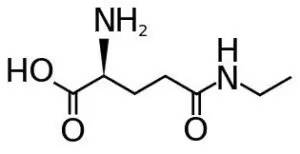
As an analogue of glutamate and glutamine, it’s hydrolyzed in your intestine and liver into l-glutamate and ethylamine. And easily crosses your blood-brain barrier.
L-Theanine is one of the very few nootropics known to modulate brain waves. It affects alpha brain waves which are associated with relaxation. Providing an alert calmness, L-Theanine helps in promoting super-learning, flow states and joy.
L-Theanine boosts the neurotransmitters serotonin, dopamine and GABA in your brain. As well as increasing Brain-Derived Neurotrophic Factor (BDNF) and Nerve Growth Factor (NGF).[ii]
L-Theanine is known for helping to relieve stress, improve cognition, boost mood and cognitive function.
How does L-Theanine work in the Brain?
L-Theanine boosts brain health and function in several ways. But two in particular stand out.
- L-Theanine reduces physical and mental stress. L- Theanine helps increase alpha brain waves which are associated with mental relaxation and concentration.
One study in South Korea worked with 20 healthy male volunteers aged 18 – 30 years. One group was given L-Theanine tablets, and the other group a placebo daily for 7 days.
Brain waves were measured 40 minutes after administration of the tablets. The researchers analyzed alpha wave power values. And concluded that L-Theanine tablets promoted the release of alpha brain waves related to mental relaxation and concentration.[iii]
In May 2016, researchers at Simon Fraser University in Canada developed a technology to clinically measure brain wave patterns. With this technology, we’re now able to detect cognitive dysfunction before it happens. Imagine the implications of this new technology when applied to the nootropics world.[iv]
- L-Theanine increases neurotransmitters. Research shows that L-Theanine increases dopamine, serotonin, and GABA in your brain.[v] And it reduces the excitatory neurotransmitter glutamate which is associated with stress, tension and agitation.[vi]
A study done in Japan worked with 12 people who underwent 4 separate trials. One in which they took L-Theanine at the start of the experiment. One in which they took it half-way through. And two control trials in which they took either a placebo or nothing.
The results showed that L-Theanine resulted in a reduction in heart rate and s-IgA associated with acute stress. The researchers concluded that L-Theanine could cause anti-stress effects via the inhibition of cortical neuron excitation.[vii]
How things go bad:
As we get older, our brain chemistry and energy metabolism changes.
↓ Neurotransmitter levels decline
↑ Glutamate levels increase
↑ Stress levels increase
↓ Long-term memory and mood decline
↓ Quality of sleep declines
All of these changes can happen at any age once we reach adulthood. And are contributing factors to the neurodegenerative diseases of aging, and quality of life.
L-Theanine benefits
L-Theanine energizes without draining, calms without putting you to sleep, and motivates without causing a jagged edge.
 Tea (as a source of L-Theanine) can have as much caffeine as some coffees. And yet doesn’t exert the same “speedy” effect. And the reason is the ingredient L-Theanine.
Tea (as a source of L-Theanine) can have as much caffeine as some coffees. And yet doesn’t exert the same “speedy” effect. And the reason is the ingredient L-Theanine.
You can actually see L-Theanine’s effect in your brain using an EEG. Brain waves are smoothed out rather than flattened out.[viii] So your body is relaxed, your mind is calmed, but you don’t get sleepy. And L-Theanine, once it crosses the blood-brain barrier, raises levels of serotonin and dopamine.[ix]
L-Theanine even improves your quality of sleep. Researchers in Japan gave volunteers 200 mg of L-Theanine daily and recorded their sleep patterns. Sleep quality, recovery from exhaustion, and feeling refreshed were all enhanced by L-Theanine.[x]
And L-Theanine puts you in a better mood. Once it crosses your blood-brain barrier, L-Theanine changes levels of amino acids affecting serotonin, dopamine, and GABA. Having a modulating effect on mood.[xi]
How does L-Theanine feel?
Your unique neurochemistry including neurotransmitters, brain waves, brain structure and even regional brain activity will influence your response to L-Theanine.
Most neurohackers report a calming effect within 30 – 45 minutes of taking L-Theanine. Cognition gets a boost, and energy levels rise without the jitteriness caused by stimulants like caffeine.
Some report L-Theanine has stopped their anxiety and panic attacks. Just don’t combine it with anti-anxiety meds like Xanax.
Most report an overall improvement in the sense of well-being and quality of life. And nearly all remark on better quality sleep.
L-Theanine Clinical Research
Green Tea reduces incidence of stroke
Research has found that if L-Theanine is present in the body at the time stroke occurs, brain damage will be significantly reduced.
In this monster study done in China, researchers selected 14,212 subjects from 12 provinces. Ages ranged from 35 – 60 years old. The study looked at tea drinking status, dose and type of teas.
This study concluded there was a 40% decreased risk of stroke in those who drank green, black or jasmine teas.[xii]
L-Theanine improves memory
In this double-blind, placebo-controlled study, the effect of L-Theanine on memory and attention was investigated.
91 subjects with mild cognitive impairment were enrolled in this study. One group received 1,680 mg of L-Theanine daily for 16 weeks. And the control group received a placebo.
The study concluded that L-Theanine increased brain Theta waves associated with cognitive alertness and creativity. And there were improvements in memory. The results of this study suggested that L-Theanine has potential as an intervention for cognitive improvement.[xiii]
And that is an understatement by any stretch. People spend years meditating. With the goal of reaching consistent access to brain wave states like Theta. In this trial, they did it with a dose of L-Theanine. The same type of dose you could get with a few cups of quality green tea.
L-Theanine reduces stress
Considerable research has been dedicated to L-Theanine and its benefits to stress reduction in both animal and human studies. And we have ample documentation that corticosterone and stress exert negative effects on memory.[xiv]
Corticosteroids which are secreted after stress, have a profound impact on long-term potentiation and memory formation.[xv]
In this animal study, rats were fed water containing L-Theanine for 3 weeks and put through some stress inducing exercise. The researchers found that corticosterone levels were lower in the rats who used L-Theanine compared to those who had none.
In fact, stress had no effect on the animals who were fed L-Theanine. Memory was not affected. The researchers concluded that L-Theanine modified corticosterone secretion. And L-Theanine is a strong preventive measure in preventing memory loss otherwise induced by stress.[xvi]
L-Theanine Recommended Dosage
Recommended dosage of L-Theanine is 100 – 400 mg once or twice per day. With a maximum of 1,200 mg per day according to the Cleveland Clinic.[xvii]
L-Theanine is water soluble so you can take it with water.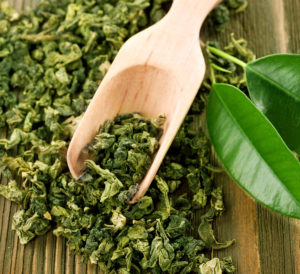
Labels on quality green tea often only display the amount of green tea leaf available in each bag in milligrams (mg). But not its L-Theanine content. Green tea that’s steeped correctly will offer 1-2% L-Theanine per cup. So 1,500 mg of green tea leaf would be about 30 mg. of L-Theanine (at 2%).
We often say that YMMV, and this is especially applicable to L-Theanine. Find out what works best for you. Start at a lower dose like 100 mg. And work your way up until you achieve the effects you’re looking for.
L-Theanine Side Effects
L-Theanine is a naturally occurring amino acid found in plants like tea or one species of mushroom. So it’s considered non-toxic and very safe.
Theanine seems to decrease blood pressure. So if you’re on meds for high blood pressure, use L-Theanine with caution. Your blood pressure could go too low.
Type of L-Theanine to Buy
L-Theanine is available in green, black and white teas. Green tea contains the most L-Theanine.
A great side benefit for neurohackers is green tea also contains caffeine. A cup of good quality green tea has less caffeine than a cup of coffee. About 10 mg less.
L-Theanine + Caffeine stack
One study done at Unilever in the UK looked at the combined effects of L-Theanine and caffeine on cognitive performance and mood. They compared 50 mg of caffeine with and without 100 mg of L-Theanine.
The research team had 27 volunteers participate. And based measurements on word recognition, rapid visual information processing, critical flicker fusion threshold, attentions switching and mood.
Performance was measured at the beginning, and again 60 minutes and 90 minutes after consumption. Separated by a 7-day washout period.
Caffeine improved alertness at 60 mins. And accuracy on attention-switching at 90 mins. The L-Theanine and caffeine combination improved both speed and accuracy, and reduced susceptibility to distracting information on the memory task.
The research team concluded that, “L-Theanine and caffeine in combination are beneficial for improving performance on cognitively demanding tasks”.[xviii]
And for an added bonus, L-Theanine takes the jittery-edge off of caffeine consumption.
The best pre-formulated caffeine + L-Theanine stack I’ve tried, and use is Click for Performance Lab® Caffeine 2 . It contains Natural Caffeine (from Coffea Robusta seeds) 50 mg, L-Theanine 100 mg, L-Tyrosine 250 mg, with a balanced NutriGenesis® B-Complex. For alert clean energy without the jitters.
L-Theanine from green tea
Extracting the optimal amount of L-Theanine from green tea is both art and science.
Researchers at the University of Newcastle in Australia set out to determine optimal conditions for water extraction of L-Theanine from green tea. They examined 4 different extraction methods. And learned that temperature, extraction time, ratio of water-to-tea and tea particle size had significant impacts on extraction yield of L-Theanine from green tea.
They concluded, “The optimal conditions for extracting theanine from green tea using water were found to be extraction at 80 °C for 30 min with a water-to-tea ratio of 20:1 mL/g and a tea particle size of 0.5-1 mm.” [xix]
So to get the most nootropic value when using green tea as your L-Theanine source – follow the directions. Just sayin’…
L-Theanine Supplements
L-Theanine is available in capsule or tablet form from several supplement manufacturers. Japanese company Taiyo is the oldest and most established company in the green tea supplement industry. Taiyo developed and patented a method for L-Theanine extraction from green tea called ‘Suntheanine®’.
Research has shown that some supplement makers using their own extraction method for L-Theanine, contain more than just the “L” form of Theanine. Turns out if it’s not done exactly right, you end up with a “D” form of Theanine.
D-Theanine may have a very different action in your body than L-Theanine. We’re not saying it’s dangerous. You just may not get all the benefit of pure L-Theanine.
So read the labels and reviews by people who have tried the product.
I recommend Mind Lab Pro because it works. And addresses all aspects of anxiety resistance, memory and cognitive enhancement, stabilizes mood, brain repair, and maintenance.
This premium nootropic stack is designed to affect neurotransmitters, cognitive energy, brain waves, neuroprotection, and regeneration. See my Mind Lab Pro review for a detailed report.
You will also find L-Theanine in Click for Performance Lab® Caffeine 2 . It contains Natural Caffeine (from Coffea Robusta seeds) 50 mg, L-Theanine 100 mg, L-Tyrosine 250 mg, with a balanced NutriGenesis® B-Complex.
Nootropics Expert Recommendation
L-Theanine 100 – 500 mg per day
 I recommend using L-Theanine as a nootropic supplement.
I recommend using L-Theanine as a nootropic supplement.
Your body cannot make L-Theanine on its own. It’s a non-dietary amino acid only available from tea (and one little-known mushroom).
L-Theanine affects Alpha and Theta brain waves. This alone will help calm your mind, reduce stress, and help you stay alert. You’ll get even more cognitive benefit by stacking L-Theanine with caffeine.
L-Theanine helps boosts the neurotransmitters dopamine, serotonin, and GABA. Improving alertness and attention. And boosting cognition and memory.
And it reduces the excitatory neurotransmitter glutamate which is associated with stress, tension and agitation.
L-Theanine helps to prevent strokes, and even reduces the damaging effects if you’ve had a stroke.
And L-Theanine has been shown to improve sleep quality.
I suggest starting with a dose of 100 – 250 mg of L-Theanine daily for nootropic use. Using either a quality supplement, or high quality green tea.
Mind Lab Pro contains a synergistic blend of 11 brain enhancing nootropics covering all aspects of cognition and brain health. See my full Mind Lab Pro review for more.
Or for a smooth energy boost I recommend Click for Performance Lab® Caffeine 2 . For alert clean energy without the jitters.

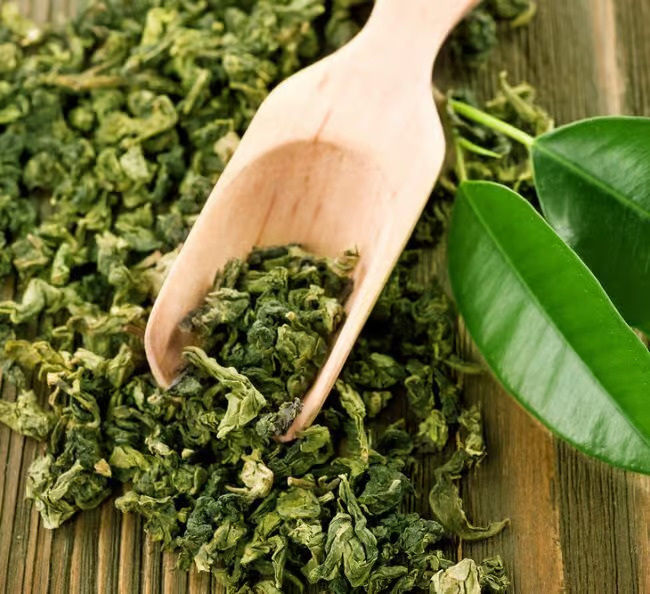
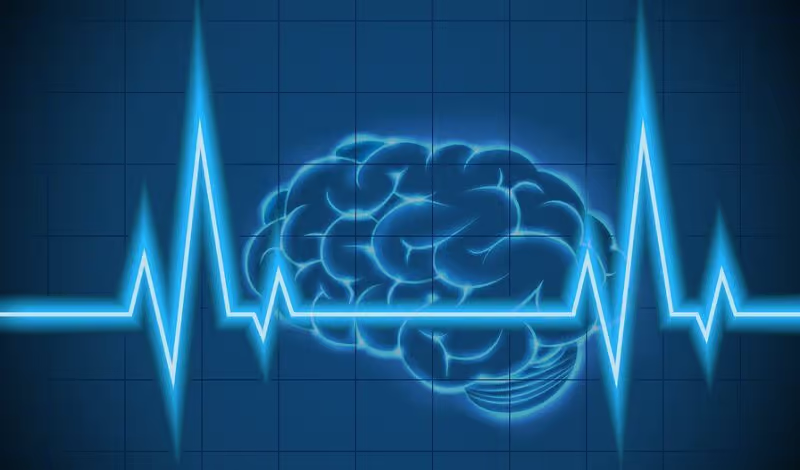
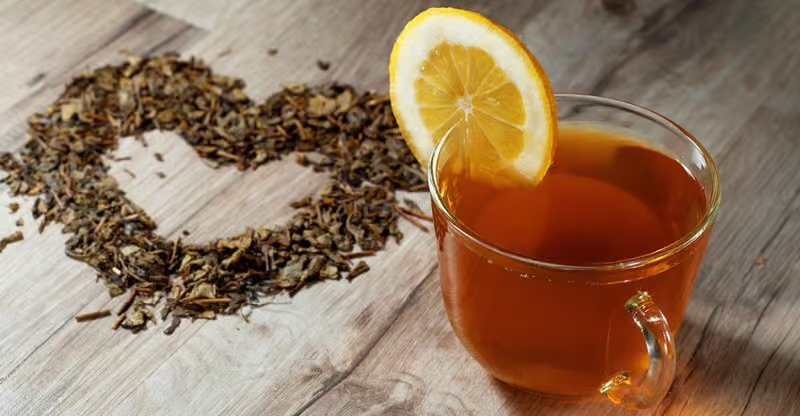





Join The Discussion - 335 comments
Jonathan
October 5, 2020
Hi David,
My Uncle is currently suffering with some form of dementia. He has anxious bouts and becomes child like, and is losing his memory along with his identity. He’s currently taking Mirtazapine daily, and they’ve recently introduced Lorazepam (supposedly only temporary).
I was thinking he might benefit from Theanine, but I’m not sure if he can take that at the same time as Lorazepam? Could Macuna, Dha, and Alpha Gpc also benefit, or would you recommend something different?
I know you’re not a Doctor, and so can’t give medical advice, but if it was your uncle, what would you do?
Many thanks
David Tomen
October 6, 2020
Jonathan, your uncle would definitely benefit from several nootropics. But not while he is on these meds. The problem is Mirtazapine which affects dopamine, norepinephrine, serotonin, and histamine receptors or transporters: https://en.wikipedia.org/wiki/Mirtazapine#Pharmacology.
And Lorazepam is a benzo which affects GABA.
That means you need to avoid nootropics that affect each of those neurotransmitters in any way. The only thing left is glutamine and acetylcholine that may be safe to boost.
Here’s some homework for you. Use this drug interaction checker: https://www.drugs.com/drug_interactions.html. And look up each of the two drugs. You’ll find a link that opens a tab that lists all of the drugs and some of the supplements that are contraindicated with either drug.
Masa
October 5, 2020
Hi David,
can you please recommend where to buy pure suntheanin, L-theanine
thanks
David Tomen
October 5, 2020
Masa, you can get an effective dose of pure Suntheanine in Mind Lab Pro (https://bit.ly/3lh3w8a). Or as a separate supplement I recommend Doctor’s Best (https://amzn.to/33xZ0LF) which is pure with no additives.
Masa
October 6, 2020
Thanks David
Bes
October 3, 2020
Hello David,
Can you take k theanine together with magnesium glycinate and ashwaganda?
Greetings Bes
David Tomen
October 3, 2020
Bes, yes you can.
Adam
August 14, 2020
I have just started taking L Theanine to manage some significant anxiety. I read (which I expected) that one can build a tolerance to it, so one might consider taking it 5 days on, 2 days off. If I am to do this, what would be recommended for me to take on my 2 days off? Lithium Orotate?
David Tomen
August 15, 2020
Adam, I’d really like to know where people get this stuff. But you are highly unlikely to develop a tolerance to L-Theanine. I can’t think of a single reason to cycle this nootropic.
Adam
August 16, 2020
Great, thank you the response.
Jan
September 14, 2020
Thanks for clarifying this, I read the same article. I’m a BENZO survivor and would NEVER want to take anything that could cause me problems.
Adam
November 11, 2020
Update:
I have been taking L Theanine daily now since August. I have played around with dosages; started with 200-300 mg/day, been as high as 800 mg day, currently doing around 500 mg/day.
I have found I built up a tolerance to it, FWIW.
This has been the most effective supplement I have found for my anxiety, also FWIW.
Donna
March 8, 2021
Hello, the article mentioned that one should not take l-theanine with Xanax. Should it be avoided too if one is on Trintellix an SSRI?
David Tomen
March 9, 2021
Donna, it’s not contraindicated but I always advise caution when combining ANY dietary supplement with prescription drugs. Especially, drugs that have a similar mechanism of action in your brain, or affect the same neurotransmitters.
Some people are more sensitive than others to this type of thing. And there is always a danger of upsetting the balance of chemicals in your brain. Just because these supplements are “natural” does not mean that they are harmless. Most of them are very powerful and need to be used wisely.
Alex
August 3, 2020
“As an analogue of glutamate and glutamine, it’s hydrolyzed in your intestine and liver into l-glutamate and ethylamine. And easily crosses your blood-brain barrier.”
Does this mean L-Theanine increases glutamate levels in the brain also? I imagine that if someone already has too much glutamate that theanine might makes things worse? I’m guessing the GABA increase is only thanks to conversion of glutamate->GABA, assuming that conversion works correctly? So perhaps theanine should be paired with something to help that enzyme convert glutamate to GABA?
David Tomen
August 6, 2020
Alex, I’ve never heard of L-Theanine causing glutamate toxicity. It’s never turned up in my research nor any of the user reviews I’ve looked at.
Heidi
July 23, 2020
Dear David
I take per day 0,5 mg Temesta (Lorazepam) which I take since 15 months. I already reduced Temesta from 1,5 mg to 0,5 mg. I want to get rid of the 0,5 mg Temesta. Can I take L-Theanin while reducing the Temesta? Why do you write that one should not take it together with a “Benzo”??
Or how can I reduce 0,5 mg Temesta without withdrawel effects.??
Greetings Heidi
David Tomen
July 23, 2020
Heidi, L-Theanine increases dopamine, serotonin, and GABA in your brain. Benzos also affect GABA. Using them together and it multiplies the GABA effect in your brain.
Jan
September 14, 2020
Benzo’s bind to GABBA receptors, does l-theanine bind there too, or just raise the amino acids that raise GABBA?
David Tomen
September 15, 2020
Jan, L-Theanine boosts levels of GABA. And has an affinity for AMPA, Kainate and NMDA receptors. But not GABAa receptors specifically.
John
July 6, 2020
Hi David. As you point out that l-Theanine increases serotonin, dopamine, and GABA neurotransmitters is l-Theanine also beneficial for depression?
David Tomen
July 7, 2020
John, yes it is helpful with depression. But depending on the cause of your depression you will likely need other nootropics in your stack. Because L-Theanine can’t create any of these neurotransmitters out of ‘thin air’. It only boosts what is already in your brain. But if you are low in any of these …
Robert McDonie
June 28, 2020
Hello David!
Will L-Theanine help in getting rid of addictions like:-
1. Narcissistic Trauma Bond
2. Social media like Facebook
Will it help in controlling the reward system and help people to think before they act?
My child is suffering from these two. The mistake we made by giving him iPhone at early age. Now, he’s hooked. He can’t stop checking for notifications and also we suspect someone’s is controlling his mind on social media, actually manipulating him.
I would really appreciate if you could make a video on these two. Getting rid of addiction of human beings and social media using nootropics if possible, or at least give some of your advices on how to make these possible. I’m sure there must be some ways to reverse these.
Thank you!
David Tomen
June 29, 2020
Robert, you can’t or at the very least should not blame yourself for someone’s addiction. I realize how difficult that is as a parent. But addictions are not “caused” by anyone. They seem to be the way a brain is “wired” compared to those who do not have addictive tendencies. I know this because of living with family members who are addicts.
And the only tried and proven method I know of for dealing with addictions successfully are 12-Step programs. Groups like Codependents Anonymous have a higher success rate than psychotherapy or other types of counselling.
I only wish that nootropic supplements could provide a cure for this disease. But they can’t. And it is a disease. It’s why you can’t “cure” an alcoholic by prescribing a drug.
A healthy brain can certainly deal better with taming addictions. Nootropics can help with that. But addicts are never “cured” or “reversed”. Addictions can only be dealt with anything resembling ‘success’ by admitting you have a disease. And are willing to accept the advice from others who are also dealing with it on how to bring it under some kind of control.